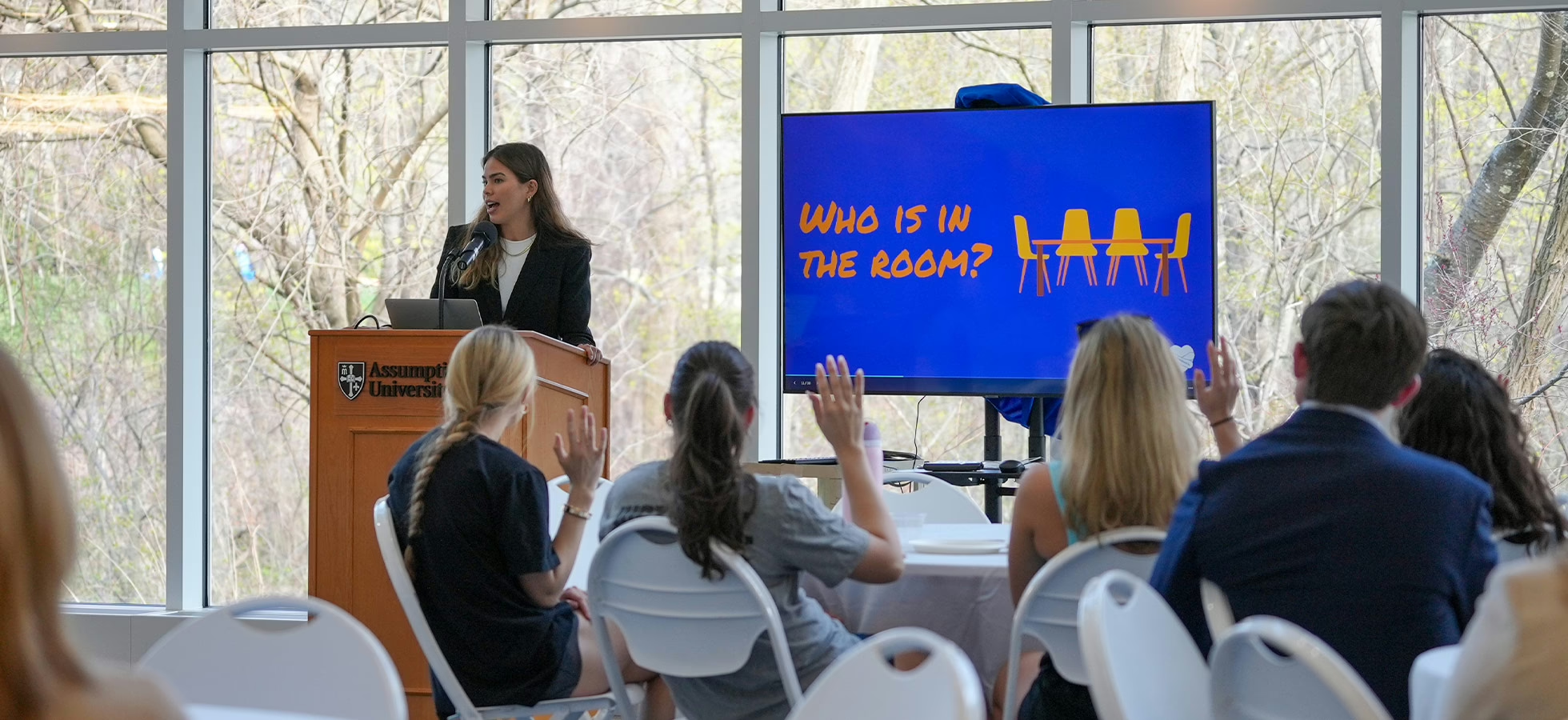Sexual Assault Awareness Month Summit Culminates a Year of Community Building

In April, Assumption University’s first Sexual Assault Awareness Month Summit culminated a year-long initiative sponsored by the Office of the General Counsel and Division of Student Affairs to foster a campus-wide culture of respect.
The initiative brought several survivors and advocates to share their powerful stories with the Assumption community, beginning in September with Chessy Prout. Chessy’s story of surviving sexual assault in high school garnered international attention in 2016 – and her pursuit for justice became a galvanizing inspiration for countless fellow survivors.
Chessy bravely launched the #IHaveTheRightTo movement and co-founded a national non-profit in its name in Washington, D.C. just a year later. I Have The Right To is a foundation dedicated to serving students, parents, and educators seeking information, support, and avenues of action against sexual assault. In support of its mission, Chessy has traveled across the world to share her story and encourage survivors to know and assert their rights under Title IX and state law.
Chessy’s keynote and book signing at Assumption was just the beginning. Throughout the academic year, the University was privileged to host other members of the Prout family to share their unique perspectives and personal missions to drive meaningful social change.
Following the launch of Assumption’s Red Folder initiative – a nationally recognized program designed to help higher education staff and students recognize and respond to signs of students in distress or crisis – Susan Prout, Chessy’s mother, joined faculty and staff in February to share best practices in responding to student disclosures of sexual misconduct. The workshop offered valuable, survivor-centered tools for offering empathy, support, and guidance to students in a compassionate and empowering manner.
Other Title IX workshops offered throughout the academic year included those offering guidance on retaliation and hostile environment claims, institutional research, digital self-defense, and consent. I Have The Right To board member Stephen Peacock also hosted a workshop on redefining healthy masculinity and addressing mental health, informed by his own experiences as a survivor.
Before the April summit, which served as a capstone to the year’s work of learning and reflection, award-winning author and artist Chanel Miller visited Assumption for a reading from her acclaimed memoir Know My Name. Miller, formerly known as Emily Doe, entered the public spotlight when she published a powerful victim impact statement that she read in court to her abuser following being sexually assaulted on Stanford’s campus.
Miller read an excerpt from the epilogue of her book, recounting her first interview after going public with her identity. After the reading, she was joined by Chessy Prout for a Q&A session, where the two recounted how they had inspired each other along their journeys in sharing their stories.
On April 22, a full day summit brought several members of the I Have The Right To foundation to Salisbury Street for workshop sessions that explored, revisited, and expanded new themes – as well as those explored throughout the year.

The morning’s informative session on the Stop Campus Hazing Act focused on forming a campus culture of upstanding in which all community members can play an active role. Next, Karen Udall, a certified Consent Educator with training in forensic psychology – as well as the mother to a survivor – shared tools for defining and embracing positive models of consent. A lunch and learn keynote presented by survivor and advocate Melanie Sachs Barton, explored the importance of trauma-informed care and the vital role that medical professionals can play in long-term healing.
The summit concluded with an interactive workshop on the principles of restorative justice practices hosted by Lucy Prout, Chessy’s sister and a Ph.D. student at the NYU Silver School of Social Work. Lucy’s experiences facilitating restorative justice circles equipped her to share tools with participants that foster accountability, repair harm, and build stronger, more empathetic relationships.
